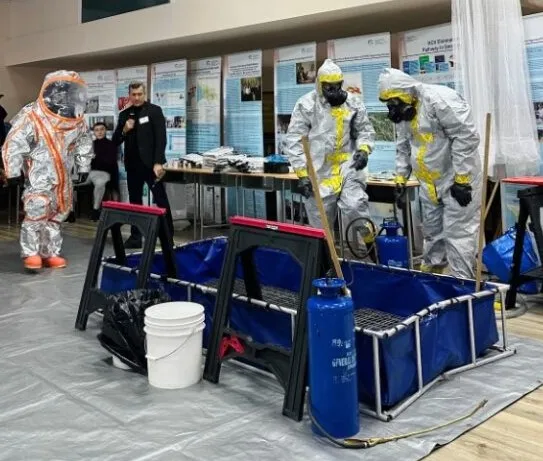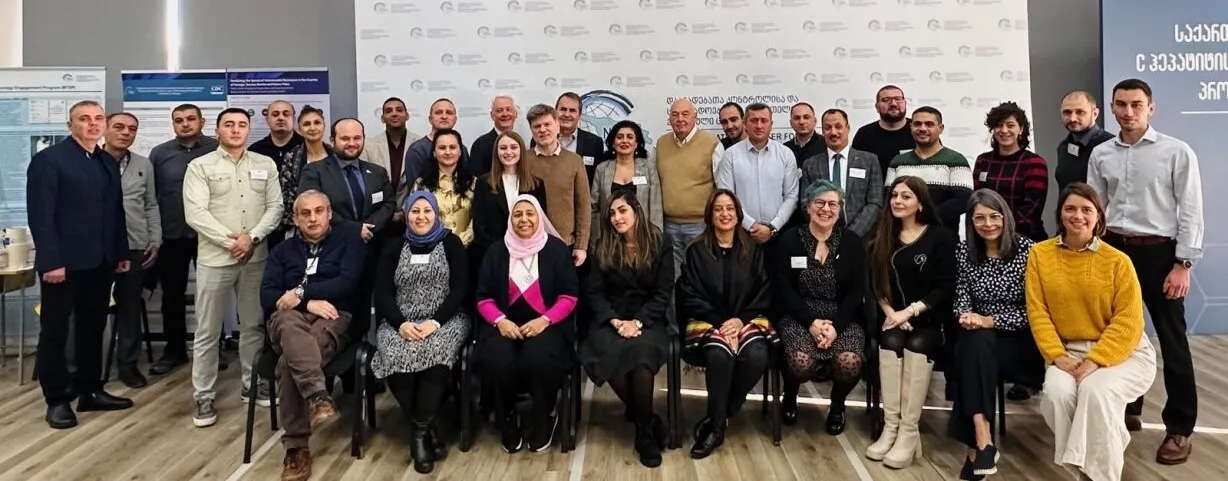ECDC, Europol, NCDC and Georgia’s Ministry of Internal Affairs organises training on biorisk awareness and mitigation

The meeting was hosted by NCDC in Tbilisi, Georgia, and was attended by 43 participants from national public health institutions, law enforcement agencies, and civil protection authorities from across the EU’s neighbourhood regions, as well as scientific experts from ECDC, Europol, and different institutions.
It constituted an excellent opportunity to discuss, within a multi-sectoral environment, the current challenges faced by European Neighbourhood Policy (ENP) partner countries in preparedness and response to biological incidents.
The training focused on how to respond to public health events that involve natural, intentional or accidental biorisks and consisted of five modules:
- Theoretical module: Introduction to biorisks
- Practical module: Personal protective equipment (PPE) and barrier management
- Scenario module (1): Natural occurring event
- Scenario module (2): Intentional release and decontamination strategies
- Scenario module (3): Accidental spill

Participants were introduced to the topics of biological agents, transmission channels, risk assessment and threats and challenges connected to bioterrorism. Experts presented the core principles for intersectoral workplace cooperation when responding to biological events and explained how to prepare for and respond to deliberate releases of biological agents. Speakers also highlighted the importance of applying targeted risk communication during an emergency event to build trust and ensure public compliance.
The course followed a ‘training-of-trainers’ approach to provide participants with the necessary competencies to enable cascade trainings at national and local levels in their own countries.
The main objectives of the three-day training were to:
- Define the specific requirements of effective biological risk protection from the perspectives of different sectors;
- Build capacities on available options when conceiving an occupational safety system for different scenarios;
- Summarize the capabilities and limitations of basic personal protective equipment (PPE) for infectious diseases of high consequence;
- Develop the ability to provide training for a wide audience of first line responders, in the framework of the adult learning context, by allowing participants to:
- Plan a strategy to provide training in their specific national or local context;
- Make use of the training material provided;
- Model the material to a specific national or local context;
- Compare available options when conceiving exercise material for different scenarios.
ECDC and Europol bio-training package
ECDC and Europol have since 2017 been offering an EU cross-sectorial bio-training package that will now also be offered to ENP partner countries.
This package contributes to mobilising knowledge in risk assessment, preparedness and response to public health emergencies posed by biological threats and will foster multidisciplinary and cross-sectoral cooperation between public health and law enforcement authorities. It also promotes cross-border cooperation between EU and ENP partner countries on health security threats of common interest through exchange of information, best practices, and lessons learned.
Background: The EU Initiative on Health Security
The EU Initiative on Health Security aims to set up a regional workforce responsible for the prevention and control of challenges posed by communicable diseases and enhancing regional cooperation to tackle cross-border health security threats in EU candidate countries and European Neighbourhood Policy (ENP) partner countries.
This collaboration between national public health authorities of the EU Member States, ENP partner countries and ECDC provides a unique opportunity to raise awareness and exchange knowledge on approaches for enhancing preparedness and response to serious threats to health, like for instance threats of biological origin.
Share this page




